Scheduled monuments in Highland
A scheduled monument in Scotland is a nationally important archaeological site or monument which is given legal protection by being placed on a list (or "schedule") maintained by Historic Environment Scotland. The aim of scheduling is to preserve the country's most significant sites and monuments as far as possible in the form in which they have been inherited.[1]
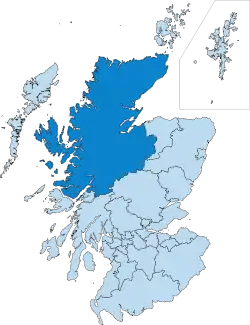
The process of scheduling is governed by the Ancient Monuments and Archaeological Areas Act 1979, which aims "to make provision for the investigation, preservation and recording of matters of archaeological or historical interest". The term "scheduled monument" can apply to the whole range of archaeological sites which have been deliberately constructed by human activity but are not always visible above ground. They range from prehistoric standing stones and burial sites, through Roman remains and medieval structures such as castles and monasteries, to later structures such as industrial sites and buildings constructed for the World Wars. Some buildings or structures which were both scheduled and listed have had their listing designations removed to reduce the duplication.
In 2017 there were 8238 scheduled monuments in Scotland.
Notable Scheduled Monuments in Highland
| Name | Location | Description | Ref No | Image |
|---|---|---|---|---|
| Old St Peter's Church | Thurso | Remains of 13th-century (or earlier) church | SM618 | .jpg.webp) |
| Braal Castle | Halkirk | Ruined 14th-century castle | SM619 | 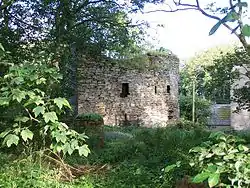 |
| Bucholly Castle | Canisbay | Remains of 15th century castle | SM620 | 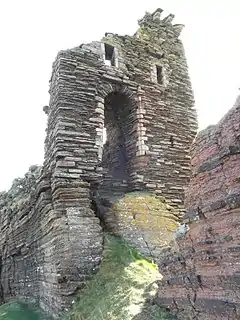 |
| Forse Castle | Latheron | Ruined clifftop 13th-century fort | SM621 | 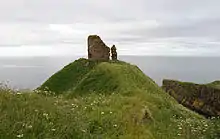 |
| Castle Girnigoe and Castle Sinclair | Wick | Two adjacent ruined castles on rocky promontary | SM622 |  |
| Keiss Castle | Wick | Ruined 16th- or 17th-century clifftop castle | SM623 |  |
| Reisgill Old Bridge | Reisgill, Latheron | Old North Road (A99) bridge over Reisgill Burn | SM624 |  |
| Rubh'an Dunain Chambered Cairn | Bracadale, Isle of Skye | Prehistoric chambered cairn | SM901 |  |
| Dunscaith Castle (Dun Scaich) | Tokavaig, Sleat | Rruined castle on the coast of the Isle of Skye | SM954 | 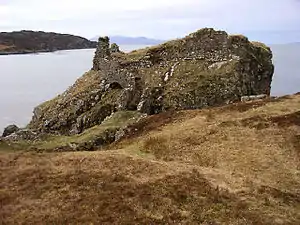 |
| Castle Tioram & Eilean Tirim | Lochaber | Ruined castle on the tidal island of Eilean Tioram | SM955 |  |
| Rait Castle | Nairn | Small masonry hall-house probably from late 13th/early 14th century. | SM1235 | 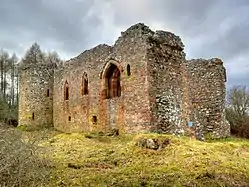 |
| Clach a' Charridh (Shandwick Stone) | Nigg | Finely carved Pictish cross-slab | SM1674 |  |
| Nigg Stone | Nigg | Finely carved Pictish cross-slab | SM1680 | 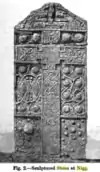 |
| Baile Mhargaite (Sandy Dun) (Lochan Druim An Duin) |
Farr | A broch or dun in a high location on a rocky bluff | SM1879 | 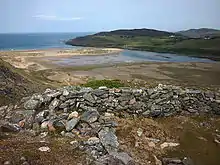 |
| Ardvreck Castle | Assynt | Ruined castle on a rocky peninsula into Loch Assynt | SM1895 | 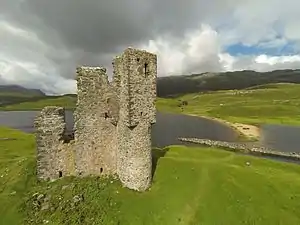 |
| Castle Varrich (Casteal Bharriach) | Tongue | Ruined small tower-house | SM1896 |  |
| Borve Castle | Farr | Ruined stronghold of Clan Mackay | SM2112 | |
| Ardtornish Castle | Morvern | Ruined hall-house which was a major seat of the Lords of the Isles. | SM2906 |  |
| Duntulm Castle | Trotternish, Isle of Skye | Ruined 14th- and 15th-century courtyard castle | SM5307 |  |
| Invergarry Castle | Kilmonivaig | Ruined seat of the Clan MacDonell of Glengarry | SM5481 | 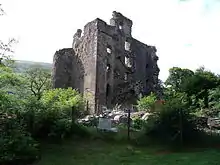 |
| Smoo Cave | Durness | Cave with prehistoric remains of occupation | SM5482 | 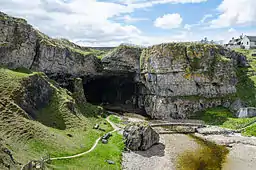 |
| Knock Castle (Caisteal Camus) | Sleat, Isle of Skye | Ruined medieval castle | SM8480 | 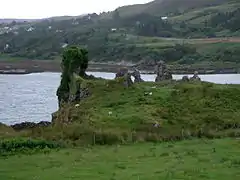 |
| Dingwall Castle | Dingwall | Ruined castle in the private garden of The Castle House | SM9678 | 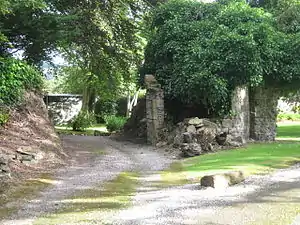 |
| Beauly Priory | Kilmorack | Remains of 13th-century Valliscaulian priory | SM90031 |  |
| Fortrose Cathedral | Fortrose | Ruined 13th century cathedral | SM90147 | 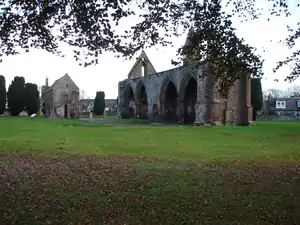 |
| Inverlochy Castle | Kilmonivaig | Ruined 13th-century castle | SM90172 | 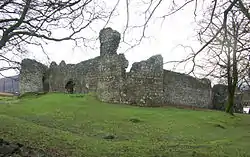 |
| Urquhart Castle | Drumnadrochit | Remains of a medieval castle on a promontory on the shore of Loch Ness | SM90309 | 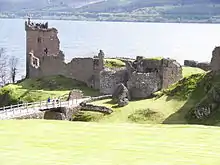 |
References
- "What is scheduling?". Historic Environment Scotland. Retrieved 2 September 2017.